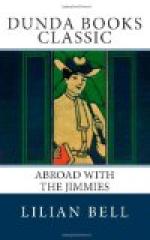“Often,” said Jimmie. “And often wondered at it. But that wheat was a small enterprise to gain a nation’s gratitude. It is the more surprising to us because it was not a national gift, but the result of the generosity and large-mindedness of a handful of men, who pushed it through so quietly and unostentatiously that millions of people in America to this day do not know that it was ever done, but over here we have not met a single Russian who has not spoken of it immediately.”
“The Russians are a grateful people,” observed Mrs. Jimmie, “but it seems a little strange to me to discover such ardent gratitude among the nobility for assistance which reached people hundreds of miles away from them, and in whose welfare they could have only a general interest, prompted by humanity.”
“Ah! but madame, Russians are more keenly alive to the problem of our serfs than any other. Many of our wealthy people are doing all that they can to assist them, and, when a crisis like the famine comes, it is heart-breaking not to be able to relieve their suffering. Consequently, the sending of that wheat touched every heart.”
“Then, too, we are not divided,—the North against the South, as you were on your negro question,” said the little countess. “The peasant problem stretches from one end of Russia to the other.”
“We are a diffuse people,” I said. “Perhaps that is the result of our mixed blood and the individuality that you spoke of, but your books are so widely read in America that I believe people in the North are quite as well informed and quite as much interested in the problem of the Russian serf as in our own negro problem.”
Bee gave me a look which in sign language meant, “And that isn’t saying half as much as it sounds.”
“Undoubtedly there is a strong point of sympathy between our two countries. Like you, we have many mixed strains of blood, and, though we are so much older, we have civilised more slowly, so that we are both in youthful stages of progress. Your great prairies correspond in a large measure to our steppes. America and Russia are the greatest wheat-growing countries in the world. Our internal resources are the only ones vast enough to support us without assistance from other countries.”
“Is that true of Russia?” Jimmie cut in, his commercial instinct getting the better of his awe of Tolstoy. “Where would you get your coal?”
“True,” said Tolstoy, “we could not do it as completely as you, and your very resources are one reason for our admiration of America.”
“In case of war, now,—” went on Jimmie. He stopped speaking, and looked down in deep embarrassment, remembering Tolstoy’s hatred of war.
“Yes,” said Tolstoy, kindly. “In case the whole civilised world waged war on the United States, I dare say you could still remain a tolerably prosperous people.”
“At any rate,” said Jimmie, recovering himself, “it would be a good many years before we would be a hungry nation, and, in the meantime, we could practically starve out the enemy by cutting off their food supply, and disable their fleets and commerce for want of coal, so there is hardly any danger, from the prudent point of view, of the world combining against us.”




